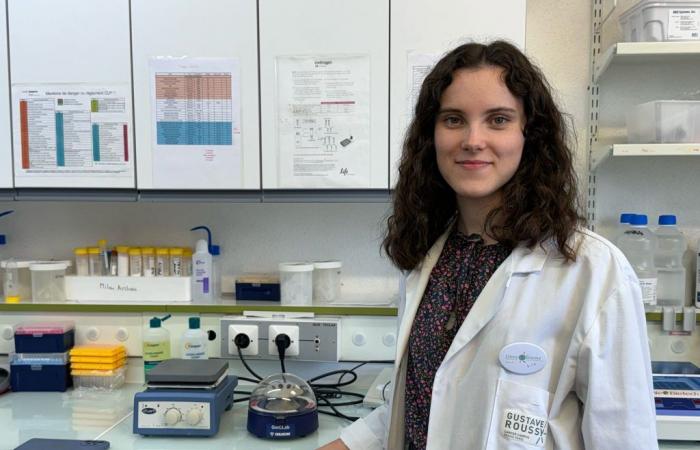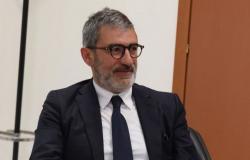Federica Gattazzo in the laboratory
Federica Gattazzo is 27 years old and is among the seven Italians who have won the very prestigious award Merit Awards, the recognition for young researchers awarded byAmerican Society of Clinical Oncology (Asco) during its annual congress, the most important event in the world in the field of medical oncology, for research that stands out for its innovative contribution to the field of oncology research.
Gattazzo’s work was chosen from among the five thousand studies presented: 138 winners, 7 Italian, in fact. Among these, one is from the young researcher enrolled in the Agrisystem doctoral school of the Catholic University and supported by MEDnoTE.
“Federica Gattazzo’s study testifies to the close collaboration between the research of a faculty that deals with agro-food sciences, and which therefore would not initially appear to be connected to the clinical world, but which, in reality, with the clinical world has crossed in a very effective and productive way” the professor specifies this Lorenzo Morelli, internationally renowned microbiologist, who is a teacher at the Cattolica and who is Gattazzo’s academic tutor. “By interweaving oncological and microbiological skills within the research doctorate for the agri-food system of the Catholic University -Agrisystem-, indications have emerged for the possible development of a very effective diagnostic tool, minimally invasive and predictive of the future onset of a tumor, or the course of the disease. A preliminary result, of course, but an extraordinary one.”
Multidisciplinary and interdisciplinary: this is how research becomes competitive in Agrisystem; concepts that pervade all the training activities proposed by the Faculty of Agricultural Sciences. Food and environmental: “In the faculty we have been implementing the concept of trans-disciplinarity for years: thanks to specific research experiences between people who come from even distant academic worlds, the ability to speak and understand each other increases, and therefore to work better together. An example of this is the Aura project, which will lead to the development of food for the elderly. Here we are working with the group of psychologists, with excellent results. What’s more trans disciplinary?”.
Another strong point of Cattolica’s training is highlighted by Gattazzo herself, who after her master’s degree concluded with a thesis in experimental oncology, wanted to continue in the direction of oncology research: “I found in Agrisystem and in the strong drive towards innovation which becomes the bearer, the answer I was looking for. The merit of this doctorate was to have invested in an innovative project, which involves extremely multidisciplinary team work that combines the world of oncology and microbiology, and considers the possible implications at a nutraceutical and food support level that this project could have. A very useful approach also considering the concrete implications that the research could have.”
Award-winning research
The study of the microbiota, of the millions of bacteria that populate our intestine, is extremely fascinating: how many and which populations of bacteria live in each patient and how they change with the administration of therapies, for example, can be important signals for understanding how the body will respond to a certain treatment.
But let’s go back to the concrete implications of the research awarded by Asco: what are they? “The analysis of the microbiota can provide new, easily accessible clinical biomarkers related to the outcome of therapeutic treatment. In addition to the predictive value, knowledge of cellular mechanisms associated with specific bacteria could allow the development of personalized therapies that target the intestinal microbiota. Clinical studies that include dietary interventions or monitoring of the patient’s diet could reveal implications at a nutritional level which could lead to the development of nutraceuticals and food supplements to support cancer patients. Although the research is only at the beginning, the implications it could have are many.”
Under the guidance of Professor Daniele Generali, oncologist and corporate tutor of Gattazzo, the young researcher had the opportunity to fly to Paris at the Gustave Roussy Cancer Campus in the laboratory of Laurence Zitvogel and Lisa Derosa, Italian oncologist, awarded several times with the Merit Award, pioneer in the study of the influence of the microbiota on cancer immunotherapy. In the Paris laboratory Gattazzo had the opportunity to develop the project presented in Asco. In particular, the research work had the objective of “understanding whether it was possible to find in the blood a reliable sign of the activation of T lymphocytes, i.e. of an immunological memory developed against some of these bacteria with the ultimate aim of identifying a potential correlation with response to immunotherapy”.
“The research carried out by Dr. Gattazzo represents a fundamental step in the one health program that the Catholic University is carrying out with determination, with particular focus on the topic of health promotion” points out Professor Daniele Generali “The microbiome is a core of research , one of the new frontiers of oncology, an expression of multidisciplinarity in which health, therapy, nutrition and the environment converge. Today the Faculty of Agricultural Sciences at Cattolica is positioning itself as a leader in this sector”.






